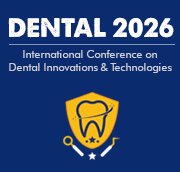Title : Oral bacteria detected in catheterism samples by patients with angina or acute myocardial infarction
Abstract:
Considerable evidence support a set of plausible mechanisms by which oral bacteria may directly or indirectly contribute to acute cardiovascular disease. Coronary artery disease occurs when there is blockage in one or more of the major arteries that supply blood to the heart; these obstructions can be partial or total and typically result in chest pain, especially when the individual is under stress and effort. The existence, location, and extent of the obstruction can be diagnosed with a selective coronary arteriogram, obtained by cardiac catheterization. In this study, the presence of Porphyromonas gingivalis, Prevotella nigrescens, Treponema denticola, Tannerella forsythia, Eikenella corrodens, Prevotella intermedia, Campylobacter rectus and bacterial Universal DNA were detected by real-time PCR, in atheromatous samples from coronary arteries obtained for catheterism examination. Fifty-nine patients with angina or acute myocardial infarction, confirmed through electrocardiogram, clinical characteristics and laboratory tests were evaluated by cardiac catheterization. Patients fulfilling the inclusion criteria were informed of the study and signed an informed consent form that was approved by the Ethics Committee in Research of Ponta Grossa State University n. 14170/08. Detection of oral bacteria was performed using universal and species-specific TaqMan probe/primer sets. All reference strains DNA produced the expected amplicons by using the species-specific primers. DNA sequencing analysis of each bacterium from positive samples showed a similarity >95%. Total bacterial DNA was found in 93,22% of the catheterism samples. All oral bacteria except for the Prevotella nigrescens and Tannerella forsythia were detected. Treponema denticola was the most bacteria detected in 6,8% samples. Additionally, unidentified microbial DNA can be observed. In conclusion, it is possible identified oral bacteria in catheterism samples, demonstrated that oral bacteria can be direct or indirect involved in the angina and acute myocardial infarction.
Keywords: Atherosclerotic diseases, oral bacteria, atherosclerosis, coronary artery diseases, acute myocardial infarction, angina



